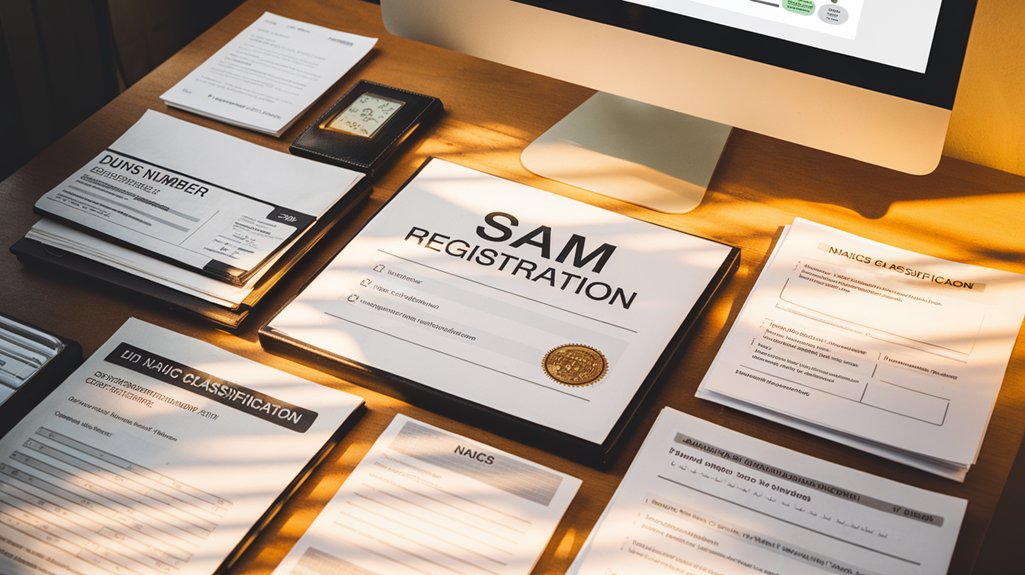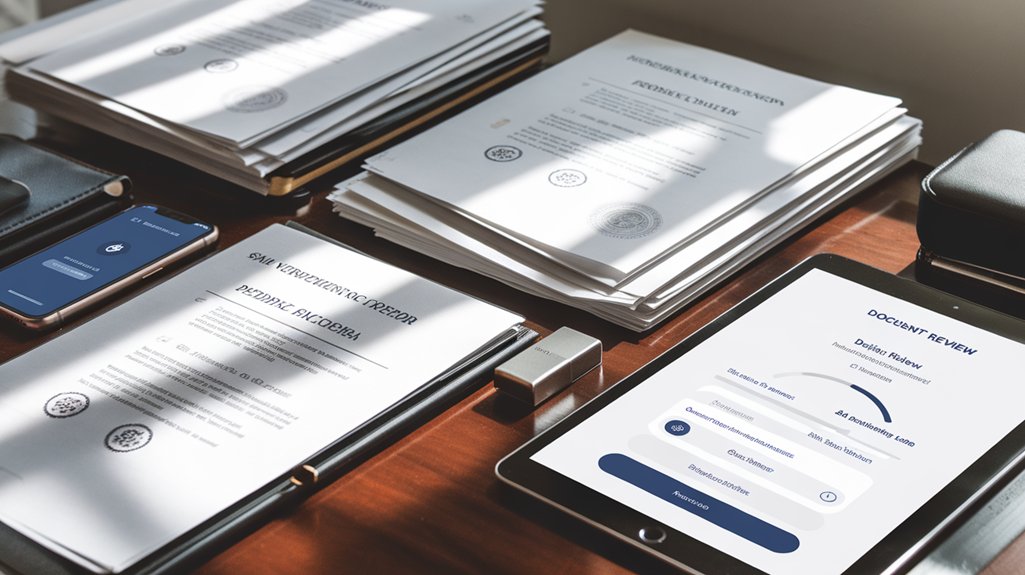SAM registration requires several essential documents, including legal business name matching IRS records, physical address verification, EIN documentation, and notarized authorization letters. Financial information for EFT enrollment, including bank routing numbers, must be prepared. Business structure documentation and applicable NAICS codes are necessary. International entities need additional requirements, including self-certified English translations with attestation clauses. The verification process typically takes 3-5 business days, with notifications sent via email throughout. Proper preparation of these documents guarantees faster processing times and fewer rejections.
Table of Contents
ToggleCore Document Requirements for a Successful SAM Registration

When preparing for a System for Award Management (SAM) registration, organizations must gather several essential documents before beginning the process. The foundation of a complete registration starts with proper entity identification materials, including the legal business name that exactly matches IRS records, physical address verification, and any DBA or trade names currently in use.
A successful SAM registration begins with proper entity identification matching IRS records and verified business documentation.
Financial documentation forms the second critical component of SAM requirements. Organizations need their Employer Identification Number (EIN), complete banking information for Electronic Funds Transfer enrollment, and the name of their financial institution with corresponding routing numbers.
For grant applicants, corporate financial statements and fiscal year-end information may also be necessary.
Additionally, businesses should prepare their NAICS codes that reflect primary business activities, entity structure documentation such as articles of incorporation, and a notarized letter designating the authorized administrator for the registration process.
Without these core documents ready, registration attempts will likely be delayed or rejected.
Maintaining an active registration status is essential for continued eligibility to pursue federal contracts, grants, and other financial assistance programs.
Special Documentation Needs for International Entities

International entities face additional documentation requirements beyond the standard SAM registration process.
Foreign organizations must provide self-certified English translations of all non-English documents, accompanied by a translator attestation clause confirming accuracy under penalty of perjury. These translations must be dated within 30 days of submission.
For verification of legal business identity, international entities can submit foreign tax identification documents, utility bills showing their physical address, or bank statements reflecting the entity’s name and location.
The IRS Form W-8BEN-E is required for foreign entities claiming tax treaty benefits.
International business licenses issued by foreign governments serve as validation documentation for NCAGE codes, which must remain active and match exactly with SAM records.
The Unique Entity ID has replaced the previously required DUNS Number.
Common rejection reasons include name/address mismatches between documents and SAM.gov entries, expired documentation, and untranslated portions of certificates or licenses.
International nonprofits should note that reduced registration fees may be available to them under special accommodations designed for nonprofit organizations within the SAM system.
The Verification Process: What to Expect After Document Submission

Once documentation has been submitted to SAM.gov, the Entity Validation Service (EVS) begins a systematic verification process that compares the applicant’s information against authoritative data sources.
This verification typically takes 3-5 business days when submitted information matches external records perfectly. However, the document timeline extends if discrepancies arise. After completing all steps, applicants should log in to check for a registration complete status as confirmation.
Applicants receive verification notifications via email throughout the process, alerting them of their status and any required actions. These communications are essential to monitor, as they may request additional documentation if exact matches aren’t found. Successful vendors must respond promptly to queries during this critical verification phase to avoid delays in their registration process.
Upon successful verification, the system assigns a Unique Entity ID and updates the entity status to “Pending ID Assignment” or “ID Assigned.”
At this point, applicants should:
- Check their entity workspace for confirmation
- Note the exact match confirmation of name and address
- Complete the remaining registration steps within SAM.gov
- Prepare to revalidate if entity details change in the future
Frequently Asked Questions
How Long Does the SAM Registration Process Typically Take?
The SAM registration timeline typically spans 2-8 weeks, though processing delays may extend this period to 10+ weeks in some cases.
While initial form completion takes approximately 45 minutes, the validation phase requires 7-10 business days according to official estimates.
Common factors affecting timeline include IRS verification bottlenecks, notarization requirements, and data discrepancies.
Organizations should begin the process well in advance of needing an active registration for federal contracting opportunities.
Can I Update My Documentation After Submission?
Yes, entities can update their documentation after submission through the SAM.gov workspace.
The update process requires using the original incident number for tracking purposes. When additional documents are needed, the EVS team sends email notifications with specific instructions.
All document updates must be submitted directly through the SAM.gov platform, not FSD.gov. Each new document submission undergoes manual validation, as the system does not automatically overwrite previous submissions.
Is SAM Registration Free for All Entities?
Yes, SAM registration is completely free for all entities. The official SAM.gov portal does not charge any fees to register, regardless of organization type or size.
While meeting eligibility requirements involves preparing proper documentation, the registration process itself incurs no cost.
Businesses should be cautious of third-party services that charge fees to complete registration on their behalf, as these are not official SAM requirements and represent optional assistance services rather than mandatory costs.
What Happens if My Registration Expires?
When a SAM registration expires, several immediate consequences occur. The entity becomes ineligible for new federal contracts, grants, or awards.
Payment processing for existing contracts may freeze, creating financial disruptions.
The renewal process requires full information revalidation, which can take weeks to complete.
Proactive management is essential, with experts recommending renewal submission 60-90 days before expiration to avoid operational disruptions and maintain continuous eligibility for federal opportunities.
Are Digital Signatures Accepted for Notarized Documents?
Digital signatures are generally accepted for notarized documents under the ESIGN Act, with important limitations.
Digital signature validity depends on state-specific notarization requirements, as regulations vary across jurisdictions. Many states now permit electronic notarization through approved platforms that use digital certificates and encryption technology.
However, certain document types, including some adoption notices and divorce decrees, may still require traditional wet signatures. Organizations should verify specific requirements with their relevant state notary division.